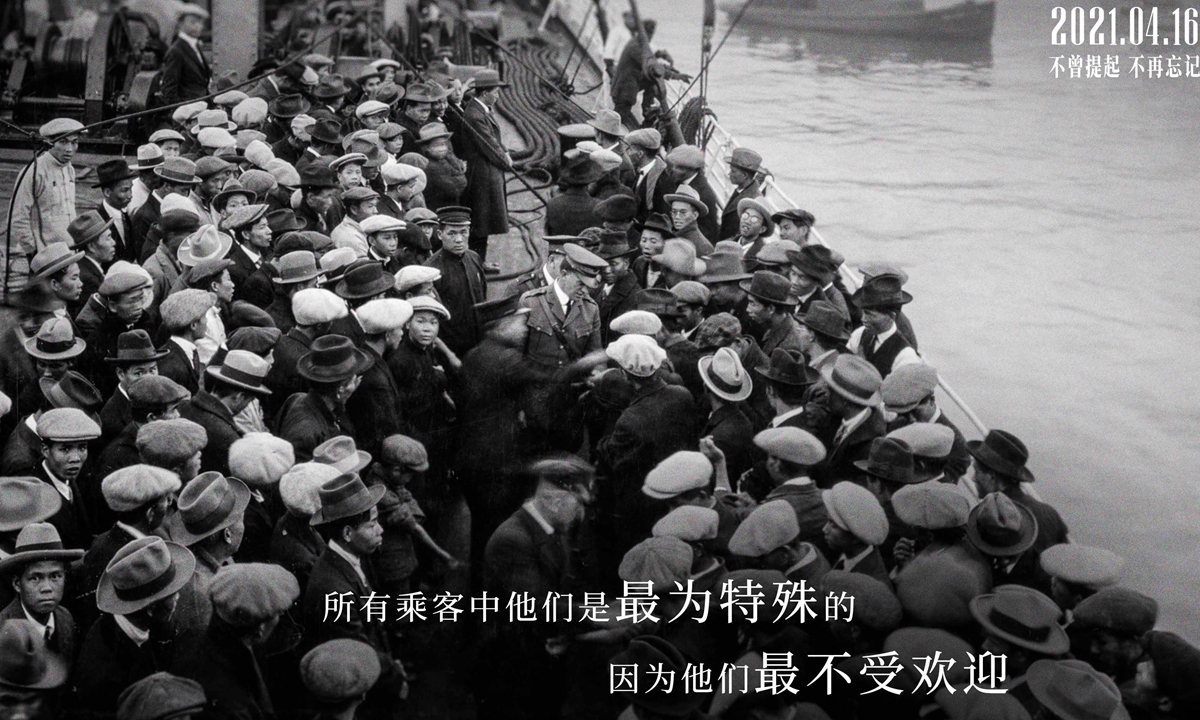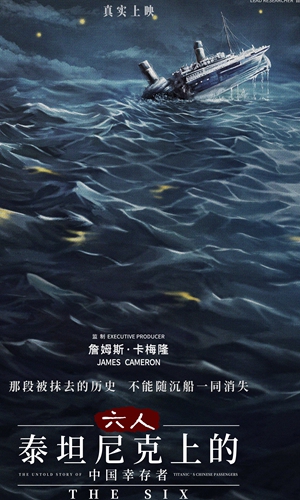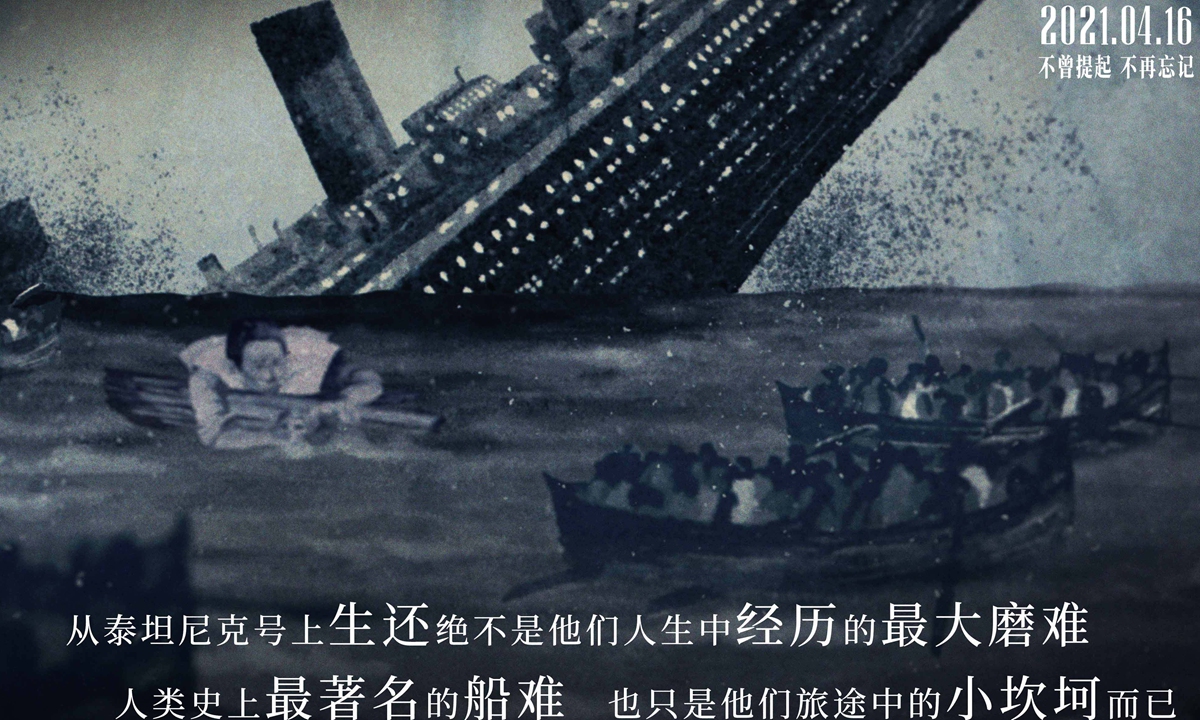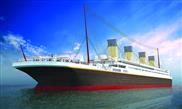ARTS / FILM
Documentary film about how Chinese survivors inspired James Cameron’s ‘Titanic’ comes to China
The secret six

Promotional material for The Six Photo: Coutersy of Hero Film

Promotional material for The Six Photo: Coutersy of Hero Film

Promotional material for The Six Photo: Coutersy of Hero Film
As Rose clung to a wooden panel that could only hold one person, she was forced to watch helplessly as her lover Jack died of hypothermia in the dark, cold sea water and gradually sank into the depths.This scene from the 1997 Hollywood blockbuster Titanic has broken countless hearts, but few people know that it was partially inspired by the experiences of a Chinese man who was one of six Chinese survivors of the disaster.
In a documentary set for release in China on Friday, Titanic director James Cameron mentions how he was impressed by the Chinese man's strong will to live, so had decided to let Jack and Rose retell his story.
A mirror for today
The Six, directed by Arthur Jones and executive produced by Cameron, is a story about the Chinese survivors who lived through the horrific disaster in 1912. Although they escaped from the marine peril, they were not able to avoid anger and misunderstandings from Western society at the time, which accused them of stowing away on the Titanic and even pretending to be women to get a seat on a lifeboat.
"The world should not just think about a romantic story when it comes to the Titanic, they should also learn about the stories of the six Chinese people who have been wiped from history," the film's trailer says, explaining its goal of ensuring these six are remembered alongside the more than 700 other survivors.
Although the six survivors were vilified by Western media a century ago, their experiences are still relevant today as a rise in anti-Asian hate and attacks against Asians in the US echoes The Chinese Exclusion Act (1882-1943) and the racist atmosphere it created in the US.
"These Chinese people headed overseas over 100 years ago and dealt with racism all the time. The abolishment of this unequal act is some of the most significant progress the US has made," Jones told media in an interview.
"And now Asian people need to keep going."
The 100-minute-long film will be released on Friday in the Chinese mainland. More than 40,000 Chinese netizens have added the film to their want-to-see lists on ticketing platform Maoyan, while more than 50,000 have done the same on Chinese media review platform Douban.
Uncovering secrets
Jones told the Global Times that he got the idea to explore the life of these six survivors in 2015.
"But this was a very complicated process. We carried out research, filming and post-production at the same time," Jones noted.
The production team traveled to many places in various countries, including Chicago and San Francisco in the US and Taishan in China as they followed the traces left behind by these Chinese survivors, who had been sailors and among whom some immigrated to other countries.
According to records of the ship's passengers, eight Chinese men bought tickets and boarded the Titanic for its maiden voyage. When the ship crashed against the giant iceberg that led to its doom, these eight people may have been among the first batch of passengers who were endangered by the accident, the documentary said.
The list of survivors shows that six of these eight were rescued. Among them, Fang Lang, who later changed his name to Fang Rongshan, was rescued by a returning lifeboat while floating on a piece of wood, and the other five managed to board a lifeboat from the ship.
Fang's story is the most complete of the six in the documentary as Jones and his research team were able to track down Fang's son in the US state of Wisconsin. The man had never known about his father's connection to the world-famous disaster.
Jones said that he felt Fang had big dreams for the future and was not content with being a sailor his whole life. Among the belongings he lost in the disaster were six neckties and suits, which Jones said shows he had plans to become a businessman when he left his hometown.
Researchers also followed another survivor's footprints to Canada, where that former passenger opened a cafe and became a well-liked member of his neighborhood.
Standing up to racism
None of these six survivors had ever shared their heart-stopping stories with the people around them. They took their secret to the grave, which led to many difficulties for Jones's team.
But why did they choose to hide their death-defying experience while the stories of other survivors are known to all? Jones said that he thinks one of the reasons is that they probably felt like an "other" in Western society and had to constantly deal with many prejudices at that time, so in order to live in peace, they decided to sink into obscurity and keep silent.
As an early immigrant from China to the West, Fang had to deal with unequal treatment, such as that imposed by the US' Chinese Exclusion Act. They bravely stood up to prejudice and fought against racism to finally improve the situation for their descendents.
"I was moved by their brave resistance against racism," Jones said.
The director noted that a century ago Chinese immigrants set the pace for resisting bigotry and now Asians in the US should continue to unite together and strive for equal rights.
"People have realized that hate and racism against Asian people is a big problem, which is progress, but the next step is to change it," the director said.




